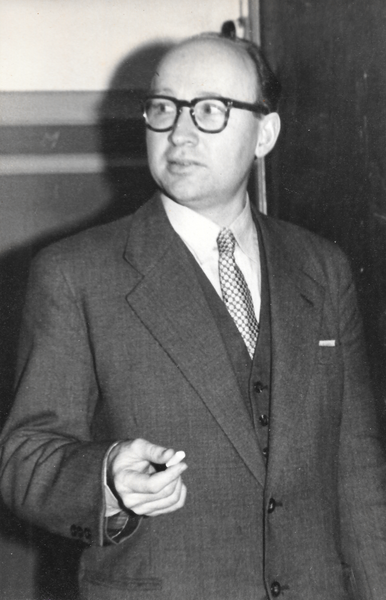Harry Wett Frederiksen
(13.07.1916 – 23.01.1974)

This biography is written by Line Wett, daughter of Harry Wett Frederiksen
Harry Wett Frederiksen (HWF) was born in Lyngby-Gladsaxe, but his father who was a wheelwright, was called up for duty during the First World War and he lived in Bagsværd. His mother was the daughter of Lyngby's coppersmith. HWF's association to Lyngby and its environs lasted his entire life.
After the war, the family moved to a fourth floor apartment on Nørrebro and later to Brønshøj with the green boglands. Linguistically, HWF grew up surrounded by his father’s cosy Mid Sealandic dialect as well as his mother’s nice and distinct dialect from her native Lyngby [a neighbourhood immediately North of Copenhagen]. In his home, there were bookcases with dictionaries of foreign languages and other dictionaries, a big pile of issues from National Geographic, books about museums and from the museums, about the Danish country, about artware. From very early on, HWF was a book lover.
Between the age of 12 and 18, HWF had long periods of time with rheumatic fever, and for several months he had to spend at the commune hospital during these years. For a child who wanted to go to school, his illness was a handicap. However, his love of reading, energy and having a positive mind let him put his time to good use by reading more than just the mandatory school subjects thoroughly. It was possible for him to read about topics in many different academic directions, and the family considered him as their own private encyclopedia.
When he was 16, he learned stenography and tooks his exams as a stenography teacher. This ability became essential for him through his studies, ensured the bread-and-butter and for the forthcoming years, he held on to very different linguistic constellations from which he picked up at get-togethers and meetings.
The pathological picture of HWF made it impossible for him to commit as a grammar school student. Fortunately not at the "Statens Studenterkursus" [an alternate school of secondary education with an education programme consisting of two years instead of three], and HWF became a graduate student in 1935.
HWF was immediately registered at the University of Copenhagen in the subjects Danish, English and German, the latter as a minor subject.
HWF became a hard-working student. He both took lessons and taught a lot. Even to his own siblings and sister-in-laws, to whom he gave help for their academic troubles at school. When he got his own home with his Ulla, there were many evenings which passed with coffee/tea + help to one or the other with old language and other academic related topics. At evening lessons with war fugitives from the Balkans, people attended, and who later on became friends of the house and interesting conversational partners for a linguist. The bike rides to the family on West and Mid Sealand with the fascinating dialects became lesser during these years, the correspondance on the other hand was a lot more expansive. In 1948, HWF was on a study trip to England. He visited the commons schools in England and hereafter was on his own bike, which he had brought along for a roundtrip to the Scottish border to other schools. He was in Oxford because of the tone of language there, and he became a lifelong admirer of the OED and ever since, always a buyer of encyclopedias of Oxford University Press. A stay at A.S. Neill at his Summerhill school, which is oftenly misunderstood, especially fascinated him and had an influence on his own teaching. HWF's interest for teaching precisely students with lesser eagerness to learning, was already inspired by his teacher from the school on Jagtvejen, Mr. Møller, who had also introduced him to the circle and work of the Day of Children's Charity.
All in all, it was an eventful, long time at the University with many sideroads. The studies never stopped, the line of thinking linguistically and the meeting of The Linguistic Circle of Copenhagen remained a part of HWF's working life. Eventhough the evenings were spent with the family, they were spent with a dictionary, a grammar or the like, on the lap and of course the pencil and colours, ready for notes and comments. In these years of teaching which could not be done at the University, HWF developed his own text book system with teaching resources for students of linguistics. Based on his own knowledge of linguistics and subsidised by pictures and symbols, he had with this lingvision-system good learning results. (They were so good that Nato also took interest in them, and they negotiated with HWF the last years before his death for applying it.)
In the 1950's, HWF's daily life was characterised by his four different places for teaching which all had to be reached by bicycle: the common schools of Copenhagen, Teknikum and the Royal Danish Defence College and School of Telegraphy - hence Nato's interest.
In 1960, HWF was permanently employed, received lesser duty hours and recovered time again and in his spare time to seek lectures, linguistically grammatical, to which came new concerning mathematical linguistics. This became his last study.
